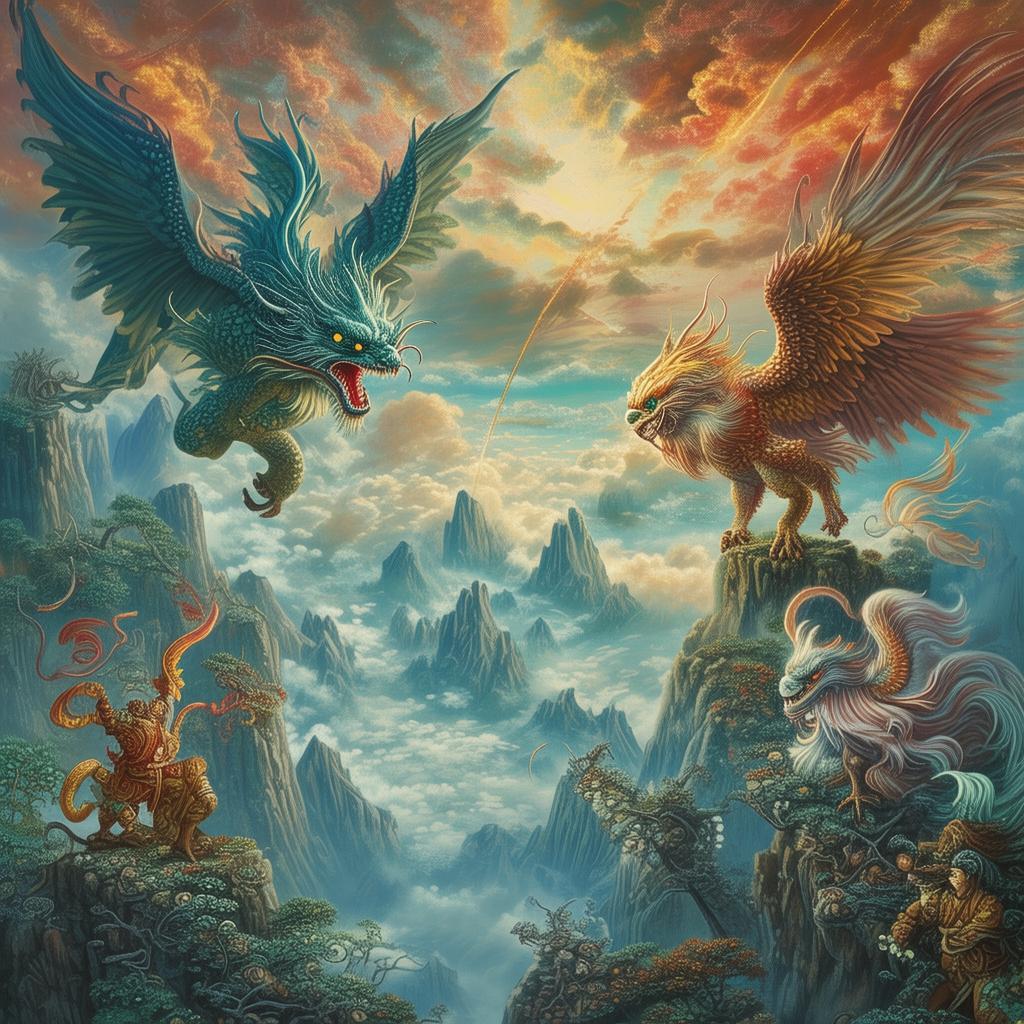Titans' Reckoning: The dual fate of Apollo
In the heart of the ancient world, where the gods and mortals danced together in the tapestry of life, there was a prophecy whispered in the winds of Olympus. It spoke of a son of the sun, Apollo, who would be bound by two fates, one bright and one dark. The bright fate was his birthright, to be the radiant light of the world, guiding souls through the heavens as the sun rose each morning. The dark fate, a shadow cast by the goddess Hera, was one of betrayal and the end of his reign.
Apollo, the god of the sun, the arts, and prophecy, was a being of unparalleled beauty and wisdom. His golden locks shone like the sun himself, and his eyes held the wisdom of the ages. Yet, even the most divine of beings were not immune to the twists of fate.

Hera, the queen of the gods, was a goddess of marriage and family, but she harbored a deep-seated jealousy of Apollo's popularity and power. She had long plotted to end his reign, and the prophecy was the perfect tool to do so. According to the ancient scrolls, Apollo would be betrayed by someone he trusted the most, and his kingdom would crumble unless he could overcome the darkness within himself.
As Apollo's reign continued, the signs of Hera's influence began to manifest. The sun was growing dimmer, the crops withered, and the people of Greece grew restless. Apollo, though, was a master of foresight. He saw the shadow of Hera's betrayal and knew he had to act.
He sought out the Oracle of Delphi, the voice of destiny itself, to unravel the mystery of his dual fate. The Oracle, a wise and ancient woman, revealed that Apollo's betrayer was not a mortal, but a fellow god, one who had been his closest ally.
Torn between his loyalty to his friend and his duty to protect his kingdom, Apollo made a decision that would change the course of his life. He chose to confront his friend, knowing that it could mean the end of their friendship, or worse, the end of his life.
The encounter was fraught with tension. Apollo stood before his friend, whose eyes held a glimmer of deceit. "You have always known of my dual fate," Apollo began, his voice steady. "But now, I must know, who among us will be the betrayer?"
His friend, unable to hide the truth any longer, confessed. "I am the betrayer, Apollo. But it was not out of malice, but out of necessity. The people need a new leader, and you must let go of your kingdom for the greater good."
Apollo's heart ached at the words, but he knew the truth. He had to save his kingdom, even if it meant sacrificing his friend. With a heavy heart, he released his friend into the arms of Hera, who had been watching the entire time.
As the friend was taken away, Apollo turned his gaze to the sky. The sun began to rise once more, its light growing brighter and brighter. The people of Greece felt the warmth once again, and their spirits lifted.
But Apollo's journey was not over. He knew that the darkness within him was not just a threat to his kingdom, but to himself. He had to confront the shadow of his own nature, the part of him that was susceptible to the whispers of doubt and fear.
He embarked on a journey of self-discovery, traveling to the far reaches of the earth, seeking enlightenment and redemption. Along the way, he encountered mortals and gods alike, each one teaching him a lesson about the dual nature of his fate.
Finally, he reached the depths of the ocean, where the ancient sea god Poseidon awaited him. "Apollo," Poseidon said, "you have sought the truth and faced the darkness within you. Now, you must embrace your dual fate, for it is the only way to truly become the god you are meant to be."
With a newfound understanding, Apollo returned to Olympus. He faced the challenges of his kingdom with a new strength, using both his light and his shadow to guide his people. The sun shone brighter than ever, and the kingdom flourished.
And so, Apollo's dual fate became a legend, a tale of the balance between light and shadow, of the power of choice, and of the resilience of the human spirit. For as long as the sun rises each day, the story of Apollo's dual fate will be told, a reminder that even the gods must confront their own shadows.
✨ Original Statement ✨
All articles published on this website (including but not limited to text, images, videos, and other content) are original or authorized for reposting and are protected by relevant laws. Without the explicit written permission of this website, no individual or organization may copy, modify, repost, or use the content for commercial purposes.
If you need to quote or cooperate, please contact this site for authorization. We reserve the right to pursue legal responsibility for any unauthorized use.
Hereby declared.









